-
Treating Gum Disease with Lasers
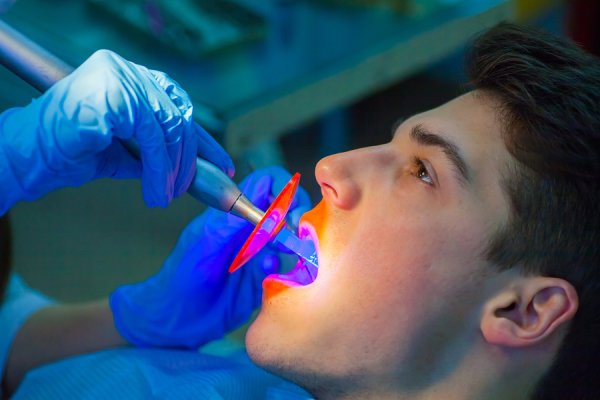
Laser dentistry is an increasingly popular way for Dr. Spalitto, a dentist near St. Louis, to treat gum disease. Gum disease can pose serious risks to your oral and overall health. When plaque accumulates between the teeth and along the gumline, it can solidify into tartar. Plaque causes both cavities and gum disease. If untreated by a dentist, gum disease leads to tender, red, and bleeding gums. It can also cause tooth loss. Fortunately, gum disease can be treated with laser dentistry. Read on to learn more how laser dentistry treats gum disease.
Targeted Method
Laser dentistry is preferred by many dentists who treat gum disease because it targets only the affected tissue. With traditional techniques, a dentist uses tools to treat problem areas. Unfortunately, these tools can cause damage to nearby tissues and lead to longer recovery times. With laser dentistry, a dentist is able to reshape the soft gum tissue. The entire procedure is almost completely pain free and requires substantially less recovery time.General Steps
When it comes to treating gum disease or periodontal disease, laser dentistry is a four-step process. First, your dentist will pre-test bacteria to determine how far the disease has progressed. Next, he or she will use a laser to de-contaminate deep gum pockets. Finally, the laser dentistry treatment is executed with a microscope. At the end, your dentist will test your gums to make sure the gum disease has been resolved.Additional Benefits
In addition to sparing nearby healthy gum tissue, laser dentistry offers various benefits for gum disease treatment. By using a laser, your dentist can eliminate gum bleeding immediately. Your dentist can also reduce or completely fix loose teeth. Laser dentistry ensures that healthy bone and ligament tissue regenerate. Finally, when compared with gum surgery, laser dentistry minimizes swelling.Find out more about laser dentistry by speaking with a dentist today. Call Dr. Spalitto at West County Dental at (314) 821-2712.
-
A Better Smile with Invisalign
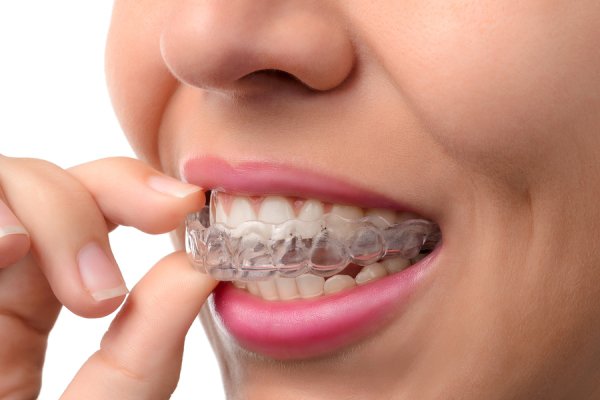
When it comes to family dentistry in St. Louis, Invisalign is Dr. Spalitto’s preferred technique for treating misaligned teeth. Invisalign can help patients of all ages achieve the smiles of their dreams.
Family dentistry has long relied upon braces to straighten teeth. If your teeth are misaligned, gapped, or overlapping, you may suffer serious oral and overall health problems. Misaligned teeth are difficult to clean, which means you can develop cavities and gum disease from accumulated plaque. When a dentist uses Invisalign to straighten teeth, it ensures that you will have a much healthier smile. Invisalign is also much easier to care for than traditional metal braces. Simply remove the clear aligners before eating or brushing your teeth. Because you have no painful metal brackets to work around, brushing and flossing are more effective. Additionally, Invisalign does not require your dentist to perform constant adjustments. Best of all, almost no one will be able to tell you are wearing braces. At the end of your Invisalign treatment, you will have a beautiful smile.
Learn more about Invisalign by calling Dr. Spalitto of West County Dental at (314) 821-2712 today.
-
Signs You May Need a Root Canal

Root canals in St. Louis are routine and completely safe procedures . While some people feel understandably anxious about the idea of root canals, an experienced dentist like Dr. Spalitto can guide you through the procedure and make sure you feel comfortable throughout. Root canals are necessary if a tooth’s inner tissue has become severely infected and requires cleaning and removal. A root canal can often preserve the natural tooth, as long as the infection is treated right away. Keep reading for some common signs you may need a root canal, including severe pain, a sensitive tooth, and swollen gums.
Severe Pain
Root canals are most often signified by a severe toothache. A root canal is required when there are problems with the tooth’s nerve and soft inner pulp. While root canal pain may be dull and relatively moderate at first, the pain becomes more severe as the infection worsens. Root canal pain does not improve on its own or simply go away. Once the infection has set in, it will continue to progress until it is treated by a dentist.Sensitive Tooth
A tooth that is especially sensitive to hot, cold, or sweet foods or drinks is another sign you may need a root canal. Tooth sensitivity can occur for many reasons. Some people have naturally sensitive teeth, while others suffer from sensitivity because the outermost enamel has worn off. Sensitive teeth may also indicate cavities. However, if you experience extreme sensitivity, especially when biting down, you may need a root canal.Swollen Gums
Swollen gums can also indicate that you need root canal treatment. When the tooth becomes infected, the nearby sensitive gum tissues can become inflamed. Your gums may feel red or tender or look swollen. However, these are also symptoms of gum disease, so be sure to visit a dentist to rule out the possibility of gingivitis.If you have been experiencing the above symptoms and are concerned you may need a root canal, contact Dr. Spalitto and the team at West County Dental by calling (314) 821-2712 today.
-
Protecting Your Teeth
Dentists in St. Louis, like Dr. Spalitto, are dedicated to keeping your smile healthy. In this video, the ADA suggests wearing a mouthguard whenever you participate in any athletic activity.In family dentistry, keeping patients’ teeth and gums healthy is important. A dentist advises both kids and adults to wear a mouthguard whenever playing contact sports, including football, basketball, or soccer. However, dentists also urges patients of all ages to wear a mouthguard even when taking part in solo athletic activities, like biking, running, or rollerblading. Your dentist can fit you with a customized, comfortable mouthguard.
To learn even more about why mouthguards are essential in family dentistry, contact Dr. Spalitto by calling (314) 821-2712 to speak to a dentist.
-
Inside the Root Canal Procedure
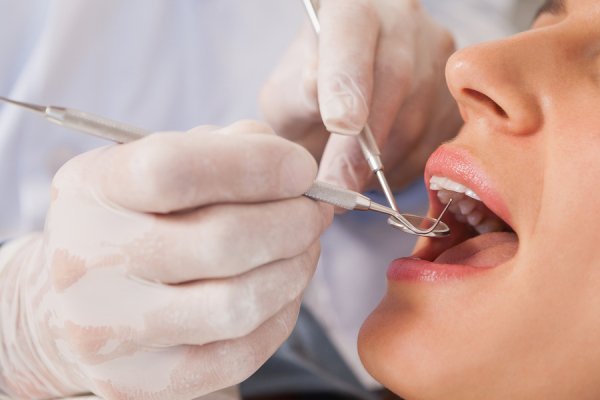
Root canals in St. Louis are common procedures in family dentistry. A dentist advises patients to have a root canal when the tooth’s inner pulp becomes infected or inflamed. Most often, patients report to their dentist office complaining of tooth pain or sensitivity. Some patients may also notice that the affected tooth has become discolored, while others feel tenderness and pain in their gums. Keep reading to learn more about the steps involved in root canals, including a full examination, initial procedure, and tooth restoration.
Full Examination
The first step in treating root canals involves a full examination by a dentist. After you report to your dentist with root canal pain or another symptom, he or she will take an X-ray to determine the extent of the infection. Next, your dentist will diagnose you with a root canal, and explain how the infection occurred. Root canals are generally performed after trauma to the tooth, deep cavities, or dental procedures. Finally, your dentist will arrange a time when you will return for the root canal.
Quick Procedure
During the root canal procedure itself, your dentist will gain access into the root canal. The tooth pulp and decayed nerve tissue are completely removed, and the tooth itself is cleaned out. Disinfectants will be used regularly to flush away infected tooth tissue. Once the tooth has been thoroughly cleaned, it is sealed. Your dentist may also place medication inside the tooth if it is more seriously infected. The final closing of the tooth will happen the same day. Depending on the tooth, you will receive a crown or a filling.Whether you want to know more about root canals or are interested in cosmetic dentistry procedures, contact Dr. Spalitto and his team by calling (314) 821-2712 today.
-
The Importance of Routine Dental Cleanings

Professional teeth cleanings are important for keeping your whole mouth healthy, which is why you should make sure to schedule regular appointments with Dr. Spalitto’s family dentistry practice in St. Louis. A dentist like Dr. Spalitto can make sure your teeth and gums stay free of plaque.
One of the most essential parts of family dentistry is simply scheduling a bi-annual visit with your dentist. Only professional teeth cleanings can effectively remove plaque and tartar where they have built up around your gumlines. While brushing twice per day and flossing each night are also important, only a dentist can use the high-powered tools necessary to get rid of plaque. If plaque is allowed to accumulate, it can lead to cavities and gum disease. Dental cleanings are also important for children, as a family dental care practitioner can provide fluoride rinses. Fluoride is vital to preserving the tooth’s hard enamel and warding off tooth decay. A dentist also examines your teeth and gums and checks your biting, chewing, and swallowing patterns to make sure they are normal.
Set up a teeth cleaning today by calling Dr. Spalitto at (314) 821-2712 today.
-
Answers to Your Questions About Laser Dentistry
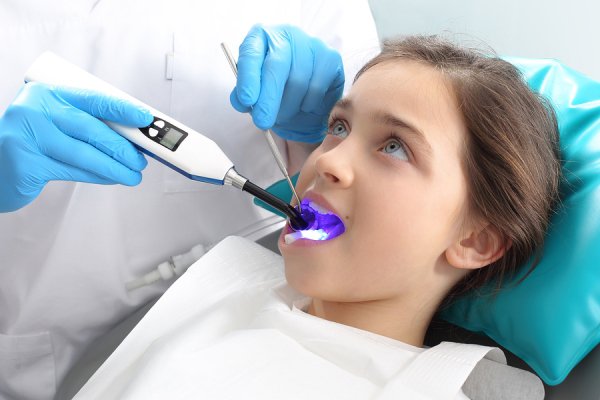
Has your dentist in St. Louis started using laser dentistry ? Laser dentistry is an innovative new technique in family dental care that allows dentists to perform both routine and complex procedures without a dental drill. With laser dentistry, patients feel virtually no pain, vibration, or noise. Additionally, dentists are able to complete multiple procedures in a single appointment. Continue reading for some answers to frequently asked questions about laser dentistry.
What Is Laser Dentistry?
Laser dentistry works when a dentist relies on a laser instead of a scalpel to perform dental procedures. With laser dentistry, dentists can do everything from filling cavities to performing root canals. Dental lasers can even be used to reduce the discomfort of cold sores or canker sores. With surgery, dental lasers act as a cutting mechanism. But dental lasers can also be used to “cure,” or set dental fillings and other bonds. Laser dentistry is a general term, so you should ask your dentist which kind of laser he or she uses.Why Laser Dentistry?
Lasers have been used in dentistry for over two decades, and dentists regularly praise their reliability. However, the best part about laser dentistry is that it cuts down on a patient’s pain—and time spent in a dentist’s chair. With laser dentistry, dentists perform hard and soft tissue procedures with no anesthesia and virtually no bleeding. Because lasers are so much faster invasive than scalpels, dentists can execute formerly complex, multi-appointment procedures in just one appointment.How Is Aftercare Different with Laser Dentistry?
Because laser dentistry is so much less invasive than traditional dental surgery, patients do not experience the same kind of painful healing process. Patients who no longer have to go under general anesthesia are able to go about with their days instead of going home to rest for at least 24 hours. Because lasers are more precise, dentists no longer have to damage healthy tissues as a side effect of removing cavities, which translates into shorter healing time for patients.To find out more about laser dentistry with Dr. Spalitto, call (314) 821-2712 today.
-
Causes of Tooth Discoloration
Teeth whitening is one of the most popular procedures in cosmetic dentistry in St. Louis . Dr. Spalitto routinely performs teeth whitening procedures in his office, helping patients achieve brighter smiles in just one visit!The teeth can lose their white color for a variety of reasons. Teeth can become externally stained by food, dark beverages, or tobacco products. A dentist also treats teeth that have become internally discolored due to cavities or after a dental procedure. Some medications may also cause the teeth to appear yellow or darkened. Finally, teeth can lose their white sheen for genetic reasons or as a natural side effect of aging. Fortunately, cosmetic dentistry now provides many safe and effective teeth whitening solutions.
Learn more about teeth whitening and other cosmetic dentistry procedures by calling Dr. Spalitto at West County Dental at (314) 821-2712. We do in-office teeth whitening that only takes twenty minutes and doesn’t cause any sensitivity.
-
What to Expect After a Root Canal

After root canals in St. Louis with Dr. Spalitto, you can expect some tenderness, but an overall quick recovery. Some patients may be wondering, what is a root canal? Root canals are procedures performed by a dentist to repair and save teeth that have become badly decayed or infected. While some people feel understandably anxious about root canal pain, root canals are very common procedures in modern dentistry and are perfectly safe. Continue reading to find out more about what you can expect after you visit Dr. Spalitto for a root canal.
Initial Sensitivity
After your dentist completes your root canal, you should expect some sensitivity and soreness. Remember, root canals are minor surgeries, and the mouth needs time to heal. As your body undergoes the natural healing process, be sure to follow your dentist’s instructions to ward off lingering root canal pain. You can take over-the-counter pain medications to reduce pain and swelling and you may also want to rely on soft foods to avoid biting down.Intermediary Recovery
After your root canal, your tooth will either be sealed with a permanent or temporary filling. If a temporary filling is placed, you should not chew on the tooth until it is restored by your dentist. In the meantime, you may expect for a thin layer of the filling to wear off and for the tooth to feel slightly sensitive and fragile. However, the initial swelling should die down after a couple days. Contact your dentist if it does not.Permanent Restoration
To ensure your tooth’s long-term health, you will need to return to your dentist to have the tooth restored in a second appointment. Because a tooth that needs a root canal almost always has a filling or significant decay, a crown or other restoration is placed to make the tooth functional again.Find out more about root canals or schedule an appointment with Dr. Spalitto by calling the team at West County Dental at (314) 821-2712. Our office practices family dentistry and cosmetic dentistry and is pleased to offer the latest dental procedures and techniques. Call us today or visit our website to learn more about our services.
-
Types of Dental Sedation
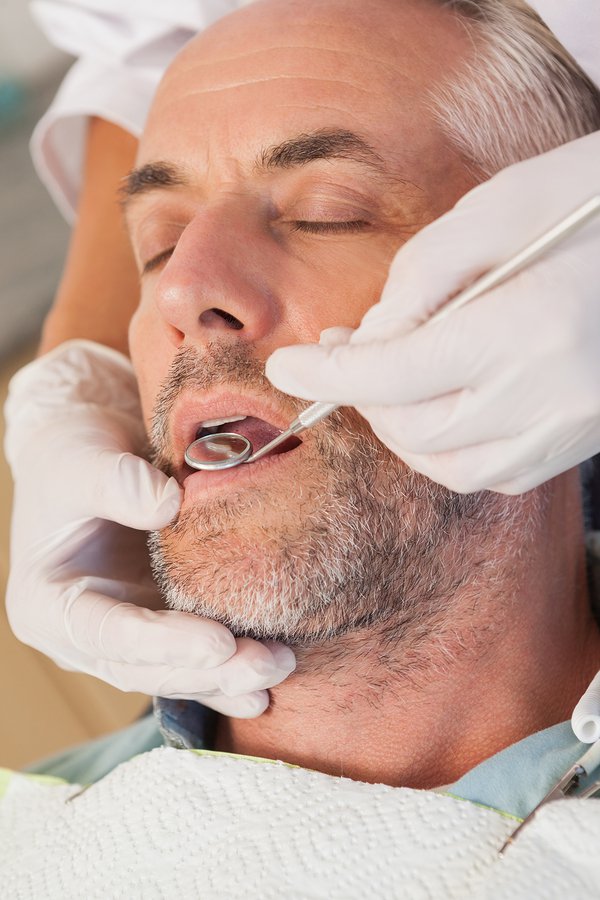
If you suffer from dental anxiety , you may want to consider visiting a sedation dentist who practices family dentistry near St. Louis. Many dental patients feel nervous or afraid before going to the dentist, but a sedation dentist can ensure that the entire experience is calming and pleasant!
Sedation dentistry uses medication to relax patients during their visit to the dentist’s office. Sedation is generally safe for patients of all ages and for a variety of procedures in family dentistry. When a dentist administers medication, patients are immediately relieved of anxiety. With nitrous oxide, patients experience a mild sedative effect but are still able to communicate with a dentist throughout the visit. Patients can still communicate with their dentist, but may not remember much of the visit—and will need a friend to drive them home. If you prefer to avoid needles, your dentist can administer sedation through oral medication instead.
Find our more about sedation dentistry or family dentistry by speaking directly with a sedation dentist. Call Dr. Spalitto at West County Dental at (314) 821-2712 to get started!
categories
- Uncategorized
- crowns
- dental veneers
- dentists
- full service dental practice
- porcelain veneers
- same day crowns
- Dental Cosmetic Surgery
- Dental Implants
- Dentistry
- Dentist Review
- Laser Dentistry
- Root Canal
- Sedation Dentistry
- Dentures
- Cleanings
- Teeth Whitening
- Abscessed Teeth
- Cosmetic Dentistry
- Infographic
- Cavities
- Sealants
- Gum Recession
- Periodontal Disease
- Dental Health
- Family Dentistry
- Dental Emergency
- Invisalign
- Filling
- Same Day Dental Procedures
- Gum disease
- Sleep Apnea
- Вечірні сукні
- Вечерние и выпускные платья в Киеве 2023 года
- Яку весільну сукню купити для цивільного весілля?
- Весільний салон Київ
Archives
2024
2023
2022
2021
- December (2)
- November (1)
- October (3)
- September (2)
- August (2)
- July (2)
- June (2)
- May (2)
- April (2)
- March (2)
- January (2)
2020
2016
2015
- December (4)
- November (3)
- October (3)
- September (4)
- August (4)
- July (4)
- June (4)
- May (3)
- April (3)
- March (4)
- February (5)
- January (6)

